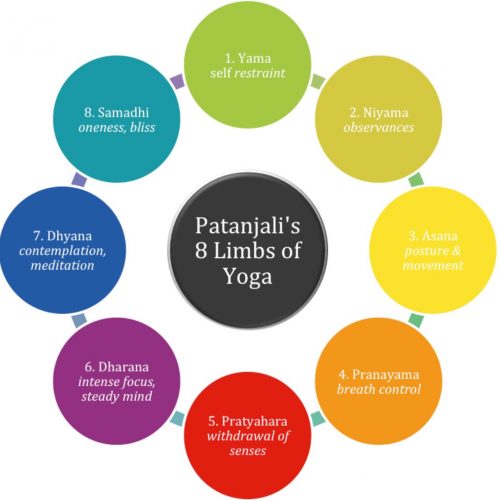Now that I’ve covered the basic premise of yoga, we’ll lead into the 8-fold path carved out by Patanjali within the yoga sutras. They are as follows and future writings during yoga month will cover each concept in a bit more depth:

We’ll start with the most important of all of the yamas, on which all of the other principles rest; the principle of ahimsa which translates non-harming or non-violence. This generally means that we do not intentionally cause pain or suffering as we live our lives. Intentionality requires mindfulness and ignorance is not to be used as an excuse for inflicting pain on another. All of us at one point or another have unknowingly hurt someone in our lives, whether it be a friend who wanted to spend more time with you when you were unknowingly wrapped up in your own life or a partner who cared deeply for you but your feelings weren’t the same. Non-harming/non-violence asks us to pay attention to the consequences that our actions have on ourselves as well as others around us. It requires that we have the sensitivity to notice our impact on this world understanding that every action has a reaction, which often does not only involve our own life. This principle asks us to think, speak, and act with loving intention and observe Jesus’ golden rule, “Love your neighbor as yourself.”
Of course, non-harming applies to how you treat yourself. If you cannot apply this tenet with yourself, you cannot apply it to others. How we treat others is a reflection of how we think, feel toward, and treat ourselves. In my own life, I’ve found that as I’ve grown in love for myself, I’d automatically started applying this principle and stopped drinking alcohol, eating land animals, denying myself things that I’d loved, and have made many other changes that have positively impacted my life. This is by no means a statement of the changes that everyone needs to make to practice this principle, but rather a statement of what deep reflection on this concept has led me to do in my own life. Your own inner guide will lead you to what is right for you as you engage in self-study and reflect on what this principle means to you.
Non-harming and non-violence of self and others requires us to find the delicate balance between loving ourselves and others. Sometimes, the lines blur a little in this human experience and we may feel that we are faced with a choice of whether to love ourselves or another more. I see this in parenting quite frequently as I tread the balance of self-care and giving of self to my family. As a mom, sometimes it feels selfish to pull back and take the time I need as an introvert. However, as I’ve reflected on this and done some inner work around it, I’ve realized that I am much better able to love my family when I’ve taken the space and time I need to replenish my own energy by reading a book in solitude, going for a long bike ride, practicing yoga alone for an hour, etc. When I fail myself by sacrificing this space and time I so desperately need, I am much more irritable and cannot be the mother and partner I want to be for them, which then leads me into the rabbit hole of “not good enough” where I don’t want to be. It is these times that deep introspection and knowing yourself really can assist you in that decision.
Balance is key when caring for self and others. There is always a way that upholds the Spirit that lives within all beings, but often we aren’t still long enough to understand what way to go. More often than not, we are reactive in the heat of the moment when it is most critical to implement the practice of non-harming. We don’t allow others the benefit of the doubt, we rush to assumptions, judgments and accusations. We are quick to defend ourselves when we feel we are “wronged” and often look to strike the other with a stronger blow rather than challenging ourselves to rise above and take the opportunity to practice this principle. We lower ourselves to the level of the person who has harmed us rather than leading the way and setting a better example. By lowering our behavior, we then harm ourselves as we know when we are acting in a way that is beneath who we are. We fail to live up to that version of ourselves that we long to be.
Non-harming requires us to think higher. All word and action stems from a thought, so the act of harm or violence actually begins in the mind. It begins when we believe that certain actions or words are justifiable in response to an external stimulus or we believe that certain life is less valuable than ours. When we think in this way, we free ourselves to conduct harm or inflict violence. It requires that we hold ourselves accountable and set a higher standard for ourselves… a standard that says, “Regardless of what anyone says or does, regardless of what happens to me, I will not let it lessen who I am and how I conduct myself. I choose to act in the highest manner I am capable of all times. I will choose to uphold all life no matter the cost.” It requires us to take the “high road” when adversity strikes, which takes so much more strength and restraint than to quickly lash out and conduct yourself in the same manner as the “offender” that has brought adversity to your doorstep. It requires us to reprogram our mind in this way so that we can elevate ourselves and our own behavior and live in a way that we can always be proud of.
When we choose to think in this way and hold ourselves accountable to a higher standard, our words shift. Because our mind is clear of harmful intention, we’re often better able to soften our words or exercise the self-discipline that is necessary to keep our mouth closed when we are on the brink of causing harm to another by using violent words meant to attack or diminish in some way. Instead, we choose to speak life into situations and state how we want to be treated clearly and articulately when faced with a situation that offends us without harming the other. We can be honest about our expectations and our feelings without causing harm.
“Death and life are in the power of the tongue: and they that love it shall eat the fruit thereof.”
– Proverbs 18:21
I mentioned in the first paragraph that these principles are meant to guide one into a life filled with love and all the riches in life. Whenever we harm another, we diminish our self. There is no way around it. When we act in a wrong way, we feel the guilt… we carry the burden of being “found out.” Our self image is tainted as a result of our actions. This principle attempts to prevent us from this and save us from a life lesser than the one that we are capable of and deserve. This principle asks us to rise into our highest self. All of the other principles that follow are in support of this one. Stay with me as we explore the remainder over the coming weeks.
I pray that this piece serves you. If you feel inspired or called to go deeper, please contact me or book a private coaching or yoga session. I’d love to assist you on the path to finding the beauty that is innately who you are.

